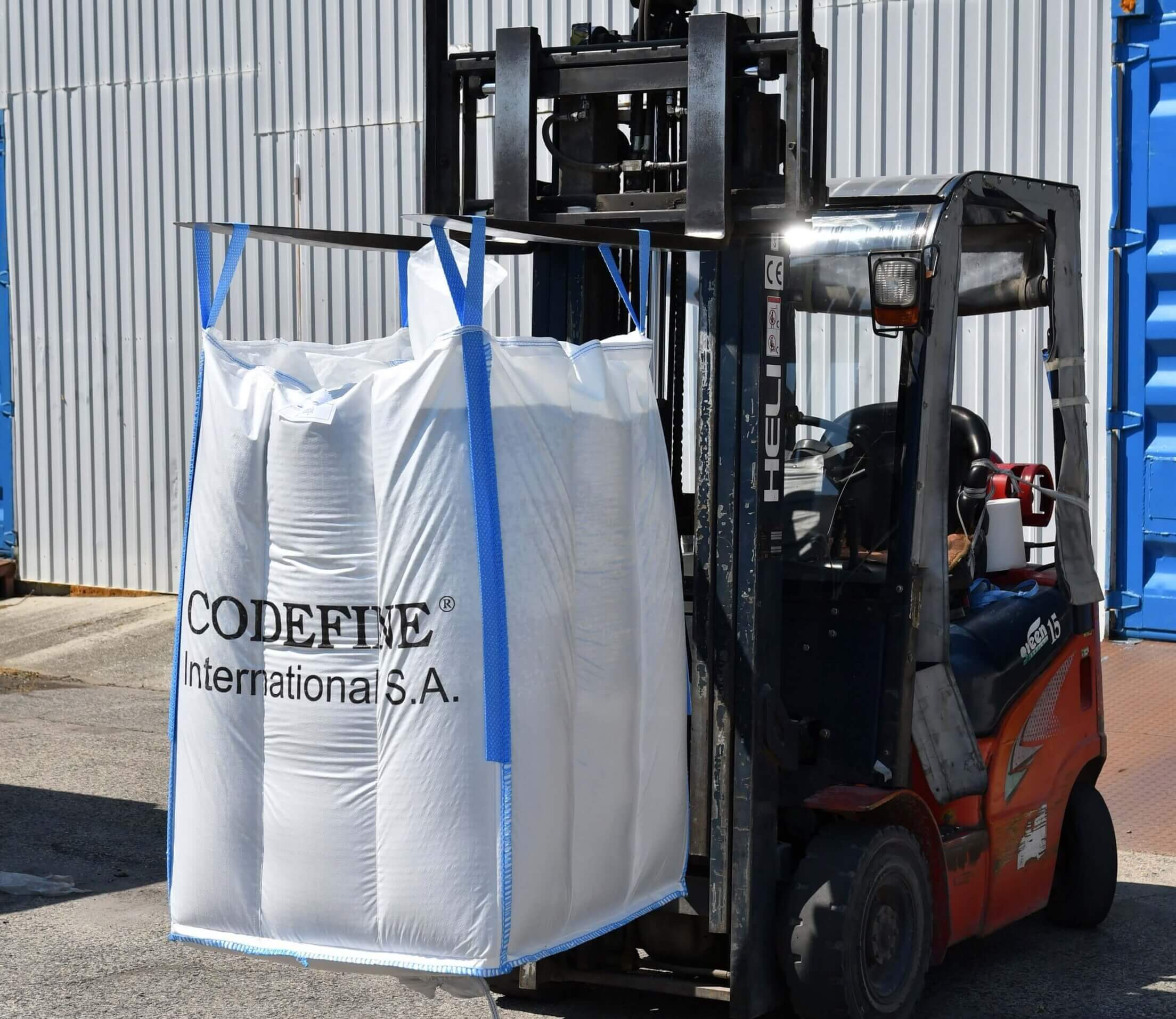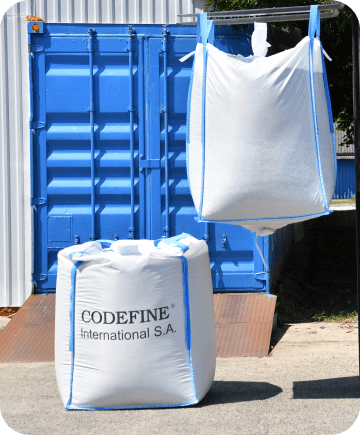Home » Posts Page » Blog » FIBC Bags: Manufacturing Process: Step-by-Step Guide

Flexible intermediate bulk containers (FIBCs) are used across almost every industry, from construction sites to chemical engineering facilities. Their durable design, versatility, and customizable nature make them the best choice for storing and transporting raw materials and finished products, However, any shortcomings during the FIBC manufacturing process can result in inferior bulk bags that could put your reputation at risk. In addition to choosing the right bags, proper FIBC filling and bagging practices are essential to ensure efficient operations and minimize waste.
Bulk bag manufacturers produce Flexible Intermediate Bulk Containers (FIBCs),large woven polypropylene bags used for storing and transporting dry, flowable materials such as grains, chemicals, construction materials, and food products. These manufacturers offer various bag types, including:
Standard FIBCs: General-purpose bags for a wide range of applications.
– Food-Grade FIBCs: Made in cleanroom environments to meet strict hygiene standards.
– Conductive FIBCs: Designed to control static electricity for handling flammable materials.
– Baffled FIBCs: Maintain shape during filling to optimize storage and transport space.
– UN-Certified FIBCs: Compliant with regulations for hazardous materials.
Custom or Specialty Bags: Tailored with specific coatings, liners, and features for unique needs.
When selecting a bulk bag manufacturer, key considerations include product quality, relevant certifications (such as ISO or BRC), customization capabilities, industry-specific expertise, supply chain reliability, and cost-effectiveness. Leading manufacturers combine high-strength materials with strict quality control to ensure safe, durable, and efficient bulk packaging solutions.
Protecting your product not only guarantees the best returns, it also ensures you’re compliant with strict health and safety regulations. This means you need to be confident that the bulk bags you’re using are fit for purpose. If your company relies on bespoke machinery and specific workflows, you’ll also need FIBC bulk bags that can be tailored with custom components to streamline everyday operations.
Choosing a reputable supplier will bring peace of mind, but having a clear understanding of the FIBC bags manufacturing process is also essential. Once you’ve familiarized yourself with the ins and outs of FIBC manufacturing, making the right choice is easier than ever.
The bulk bag manufacturing process starts with the right raw material. The best quality FIBCs are made from polypropylene resin, which is fed into an extruder along with other materials such as calcium carbonate. Sometimes, pigment might be added to have the finished product color. After being fed into the extruder, the raw materials are transformed into tapes of various sizes. This is a particularly important stage as it ensures the tapes are durable enough to be used to create bulk bags. Once durability has been established, tapes are then ready for weaving.
After being loaded onto bobbins, polypropylene tapes can be introduced to the weaving loom. It’s this part of the FIBC manufacturing process that sees bulk bag material take on its most desirable properties. Once weaving is finished, the resulting fabric will be incredibly durable and able to cope with significant loads.
Although FIBC bags are breathable, moisture intrusion can still prove an issue. In industries like the food processing and agricultural sectors, it’s crucial that stored goods are kept safeguarded against moisture. Fortunately, moisture-resistant FIBC bags are readily available. Laminate coating is added to woven polypropylene before the material is cut to size and bulk bags are given their structure.
An environment might seem dry enough, but humidity is a constant concern. Even a small amount of moisture in the air of a warehouse or packing facility can contaminate goods that aren’t properly protected. Moisture proofing is a must for any operation that handles granular products. Even a small amount of moisture can render products like salt unusable, with significant cost implications. As well as safeguarding against moisture, laminate coating makes bulk bags more secure, making them a good choice for storing and transporting ultra-fine materials like powders.
Once weaving and moisture-proofing are done with, the processed polypropylene can finally be transformed into a recognizable FIBC bulk bag. Industrial slicing machines are used to cut the polypropylene into an array of sizes and shapes. Bulk bag bases, sides, and edges are all cut to size, with automatic slicing machines ensuring a level of consistency no manual operation could deliver.
Once polypropylene rolls have been fed into the slicing machine and cut to desired lengths and shapes, the pieces are then taken to a printing machine. Whether it’s an agricultural operation or retail logistics, branding is important to any business. The printing process allows companies to add their brand identity to bulk bags, be it a full trading name and logo, or something more simple. Many customers choose to stick with monochromes when it comes to bulk bag printing, while others opt for a more colorful finish.
By this point in the process, the manufacturing process is almost complete. However, bulk bags are still missing a few essential elements. One of these is the handles which make FIBC bags such a practical solution for heavy-duty applications. Here, a more durable polypropylene fabric is called for. Once this material has been turned into webbing strips, it can be cut to create those all-important handles. Webbing strips are typically found along the seams of bulk bags, which lead to the handles, or lifting loops, found at either end of an FIBC.
At this late stage of FIBC manufacturing, the essential components of a bulk bag are ready to be assembled. Experienced technicians are brought into play to turn individual pieces of polypropylene and lifting loop handles into a single FIBC bag. These technicians are incredibly skilled at what they do and can assemble vast quantities of bulk bags at an impressive pace.
Even though the FIBC manufacturing process is largely automated, there’s still a need for testing of bulk bags to ensure they can do what they’re designed to. As such, a random sample of bulk bags from every production batch is selected to undergo burst testing.
During the burst test, the Safe Working Load (SWL) of a bulk bag can be definitively determined. Most FIBC manufacturers decide to carry out a preliminary burst test before bulk bag designs enter wide production. However, the SWL still needs to be tested again once the final bags roll off the production line.
By now, the bulk bag manufacturing process is finished. However, they still need to be prepared for customers. A bale press is used to compress FIBC bags, which makes it far easier to pack large quantities of bulk bags.
After being compressed and packed, bulk bags are transferred to storage spaces until they’re ready to be delivered to customers. Some bags can be dispatched immediately to customers, while others may have been designed with general applications in mind. In this case, FIBC manufacturers and suppliers simply assign a pre-packaged quantity of bulk bags to a corresponding order.
Robust quality control measures are put in place throughout the FIBC bulk bags manufacturing process. While burst testing falls under general quality control, other measures are enforced to ensure premium performance and durability for customers. Any reputable FIBC supplier will have a quality control team in place to ensure bags are fit for purpose and correspond to specific customer requirements.
FIBC bags are a staple of many industry sectors. They’re commonly used in industrial settings, such as processing facilities and warehouses, but can also be used in construction and mining operations. As well as being a practical choice for transporting goods from A to B, bulk bags are a superb storage option. Their compact design makes them perfect if space is at a premium. However, even an expansive warehouse can be optimized by replacing rigid containers with FIBC bags.
Unlike standardized solutions, FIBC bags are available in a range of designs, with shapes and sizes to accommodate the most exacting requirements. If a business is dealing with bulky items and heavy loads every day, FIBC bags are the ideal storage and haulage solution. However, they’re also suited to finer materials, such as granular products or powders.
They’re also an excellent choice for businesses looking to increase their safety credentials. In the chemical manufacturing industry and pharmaceutical sectors, FIBC bags can be used with confidence. However, bags intended for these industries are far more robust than their everyday counterparts, having to undergo a series of performance tests to ensure they meet strict safety requirements.

Codefine’s FIBC bulk bags are an indispensable asset across many industries. They can be used to protect valuable materials from contamination and damage while in transit, helping businesses avoid waste and keep an eye on the bottom line. FIBC bulk bags are also far stronger than alternatives like corrugated shipping containers. They’re strong enough to cope with loads of up to 2,000 kilograms, while their lightweight design helps keep shipping costs low.
Are you short on warehouse space? Rather than needlessly invest in a new storage facility, turn to FIBC bags for a cost-effective storage solution. Flexible by design, FIBC bags are easy to handle and can be readily adapted to meet specific safety requirements and business needs. What’s more, they’re an eco-friendly choice. Many FIBCs can be reused, while the polypropylene used to make them can be easily recycled if you’re keen to make your company as sustainable as possible.
If you’re looking for FIBC bulk bags you can rely on, make Codefine your first port of call. A global leader in the bulk bag manufacturing and distribution market, Codefine has been at the forefront of the FIBC sector for more than 60 years. We offer a full range of FIBC bags for all manner of applications, including agriculture, food processing, pharmaceuticals, construction, and more.
Get in touch today to talk about Codefine’s patented CSD® (Codefine Super Dustproof) technology or find out more about the Easylift Type 3 if you’re keen to go pallet-less and make significant savings.
Searching for something large? The Dragon FIBC from Codefine is 20% more durable than standard bulk bags, making it a more practical and sustainable packaging solution.